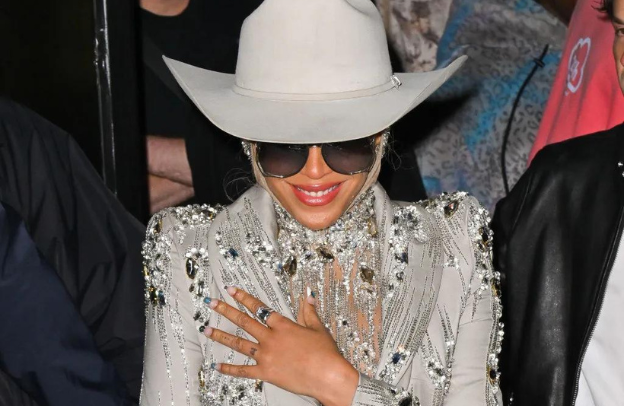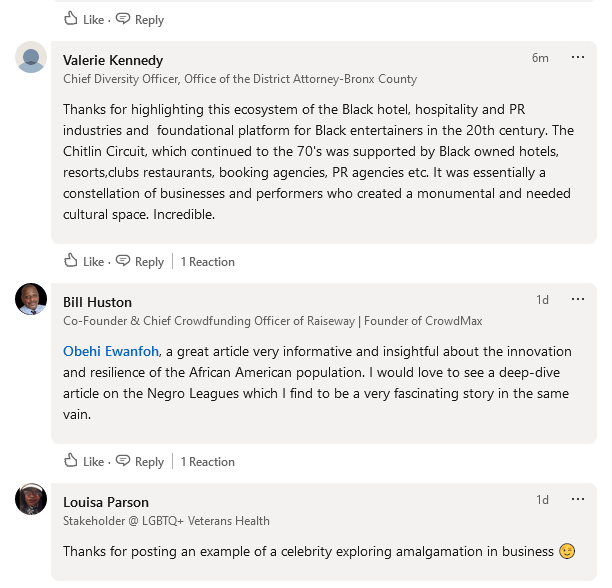Beyoncé Honors Black History: Exploring the Chitlin Circuit’s Role in Nurturing African American Talent and Resisting Segregation

Following our yesterday article: “Beyoncé’s ‘Cowboy Carter’ Album Sparks Symbolism and Sociopolitical Discourse”, there have been a good number of people talking to us about the key elements in that article such as the “Chitlin Circuit” and more. That is what led to this article.
Want to learn more about storytelling? Start by downloading the first chapter of The Storytelling Mastery.
One reader said to me “Hi Obehi… love your article on Beyonce… but let’s chat about the Chitlin Curcuit…it was so much more than you have written… it took place in all of the US.” The reader is right that the Chitlin Circuit needs in-depth coverage and that is what this article is about.
Understanding the Chitlin Circuit
In the annals of American entertainment history, one narrative stands out for its resilience, creativity, and defiance against racial segregation: the Chitlin Circuit. Emerging as a network of live entertainment venues catering exclusively to African American audiences and performers during the era of Jim Crow, the Chitlin Circuit not only shaped the cultural landscape of the United States but also provided a crucial platform for Black artists to thrive amidst adversity.
From its humble beginnings to its enduring legacy, the Chitlin Circuit represents a testament to African American ingenuity and resilience in the face of systemic racism.
There is an article you can find interesting in line with this and it’s titled: Inside the ‘Chitlin Circuit,’ a Jim Crow-Era Safe Space for Black Performers.
As stated by the article, “To understand how this network got its nickname, one needs to understand a thing or two about chitterlings. Chitterlings are animal intestines, usually the small intestines, cooked and eaten”.
Origins and Evolution: From Segregation to Celebration
The roots of the Chitlin Circuit trace back to the early 20th century, a time marred by racial segregation and discrimination in the United States. As Black performers found themselves excluded from mainstream entertainment venues, the need for a dedicated platform became apparent.
“The Chitlin’ Circuit was African-Americans making something beautiful out of something ugly,” Lauterbach told NPR in 2014, “whether it’s making cuisine out of hog intestines or making world-class entertainment despite being excluded from all of the world-class venues, all of the fancy white clubs and all the first-rate white theaters.”
Enterprising individuals like Sherman Dudley pioneered efforts to create a safe space for Black artists and audiences, laying the groundwork for what would become the Chitlin Circuit.
You might also want to see African Belief Systems And Its Influence On The Diaspora Community

The name itself, “Chitlin Circuit,” evokes the spirit of African American culture and culinary tradition. Derived from the beloved dish of chitlins, the term signifies not only a network of entertainment venues but also a celebration of Black identity and heritage.
Just as chitlins have been cherished as a delicacy by African Americans, the Chitlin Circuit emerged as a cultural institution, fostering the growth of blues, jazz, rhythm and blues (R&B), and rock and roll.
Theatre Owners Booking Association (TOBA): Triumphs and Tribulations
In the early 1920s, the Theatre Owners Booking Association (TOBA) emerged as a significant force within the Chitlin Circuit, providing a platform for Black entertainers across the country.
Led by visionaries like Josephine Baker and Cab Calloway, TOBA offered a glimmer of hope amidst the harsh realities of segregation. However, the organization faced its own challenges, with some artists decrying its grueling demands and derogatorily dubbing it “Tough on Black Artists.”
Despite its eventual collapse, TOBA laid the groundwork for future endeavors within the Chitlin Circuit, paving the way for entrepreneurs like the Ferguson brothers to establish their own booking agency. Through their efforts, venues across the nation became interconnected, forming a vibrant tapestry of Black entertainment and cultural expression.
Venues and Virtuosos: A place of Talent
The allure of the Chitlin Circuit extended far beyond its geographical boundaries, encompassing iconic venues from the Apollo Theater in Harlem to the Royal Peacock in Atlanta.
These establishments, ranging from grand theaters to intimate juke joints, provided a stage for emerging talents and seasoned performers alike.
Countless luminaries of African American music and comedy honed their craft on the Chitlin Circuit, including:
- Billie Holiday,
- James Brown,
- Aretha Franklin,
- Richard Pryor and more.
For many, these venues served as a launchpad to national acclaim, showcasing the richness and diversity of Black artistic expression.
Legacy and Renewal: Preserving the Spirit of the Circuit
While the heyday of the Chitlin Circuit may have passed, its legacy endures through the efforts of preservationists and cultural enthusiasts. Despite the challenges posed by urban renewal and changing social dynamics, several original Chitlin Circuit venues have been restored to their former glory or designated as historic landmarks.
Moreover, the spirit of the Chitlin Circuit lives on in contemporary entertainment spaces that continue to showcase African American talent across the nation.
From revitalized theaters to grassroots comedy clubs, the legacy of the Chitlin Circuit serves as a beacon of hope and resilience in the ongoing struggle for racial equality and cultural recognition.
Resurgence and Recognition: Honoring African American Heritage
In recent years, there has been a resurgence of interest in the Chitlin Circuit and its role in shaping American culture. Scholars, artists, and activists alike have sought to illuminate the often-overlooked contributions of Black entertainers and venues to the broader fabrics of the American entertainment industry.
One notable example of this resurgence is the preservation and restoration efforts aimed at reviving original Chitlin Circuit venues.
Through community initiatives and government support, historic theaters and clubs have been revitalized, ensuring that future generations can experience the vibrant spirit of the circuit firsthand.
See also African Belief Systems And Its Influence On The Diaspora Community
Additionally, there has been a growing recognition of the Chitlin Circuit’s influence on popular music and comedy. From academic conferences to museum exhibits, efforts to document and celebrate the legacy of the circuit have gained momentum, shedding light on its profound impact on American cultural history.
Challenges and Opportunities: Addressing Racism in Entertainment
Despite the progress made in preserving and celebrating the legacy of the Chitlin Circuit, challenges remain in addressing systemic racism within the entertainment industry. From disparities in representation to unequal access to opportunities, African American artists continue to face barriers to success and recognition.
One pressing issue is the prevalence of racial discrimination in casting and hiring practices. Despite strides towards greater diversity and inclusion, many Black actors and performers still encounter limited opportunities and stereotypical portrayals in mainstream media.
Moreover, the legacy of segregation continues to influence the distribution and consumption of entertainment, with African American artists often relegated to niche markets or overlooked by mainstream audiences.
This perpetuates a cycle of marginalization and erasure that undermines the cultural contributions of Black creators.
Toward Equity and Empowerment: Advocating for Change
In light of these challenges, there is an urgent need for concerted efforts to promote equity and empowerment within the entertainment industry. This includes advocating for greater representation and visibility of African American talent across all facets of the entertainment landscape.
One avenue for change is the promotion of diverse storytelling and authentic representation in media and entertainment. By elevating diverse voices and narratives, we can challenge stereotypes and foster greater empathy and understanding across cultural divides.
You might also like Great Opportunities In The Creative Economy For People In The African Diaspora Community
Additionally, investment in education and mentorship programs can help cultivate the next generation of African American artists and industry leaders. By providing access to resources and opportunities, we can empower aspiring talent to navigate the complexities of the entertainment industry and realize their full potential.
Conclusion: Embracing a Vision of Inclusive Excellence
As we navigate the complexities of the entertainment landscape, it is imperative that we remain steadfast in our commitment to equity, diversity, and inclusion.
The legacy of the Chitlin Circuit reminds us of the transformative power of cultural expression and the importance of honoring African American heritage in all its richness and diversity.
By confronting racism head-on and amplifying marginalized voices, we can create a more vibrant and inclusive entertainment industry that reflects the true diversity of the human experience. Together, let us embrace a vision of inclusive excellence where every artist has the opportunity to shine, and every audience member feels seen and heard.
Want to learn more about storytelling? Start by downloading the first chapter of The Storytelling Mastery.





